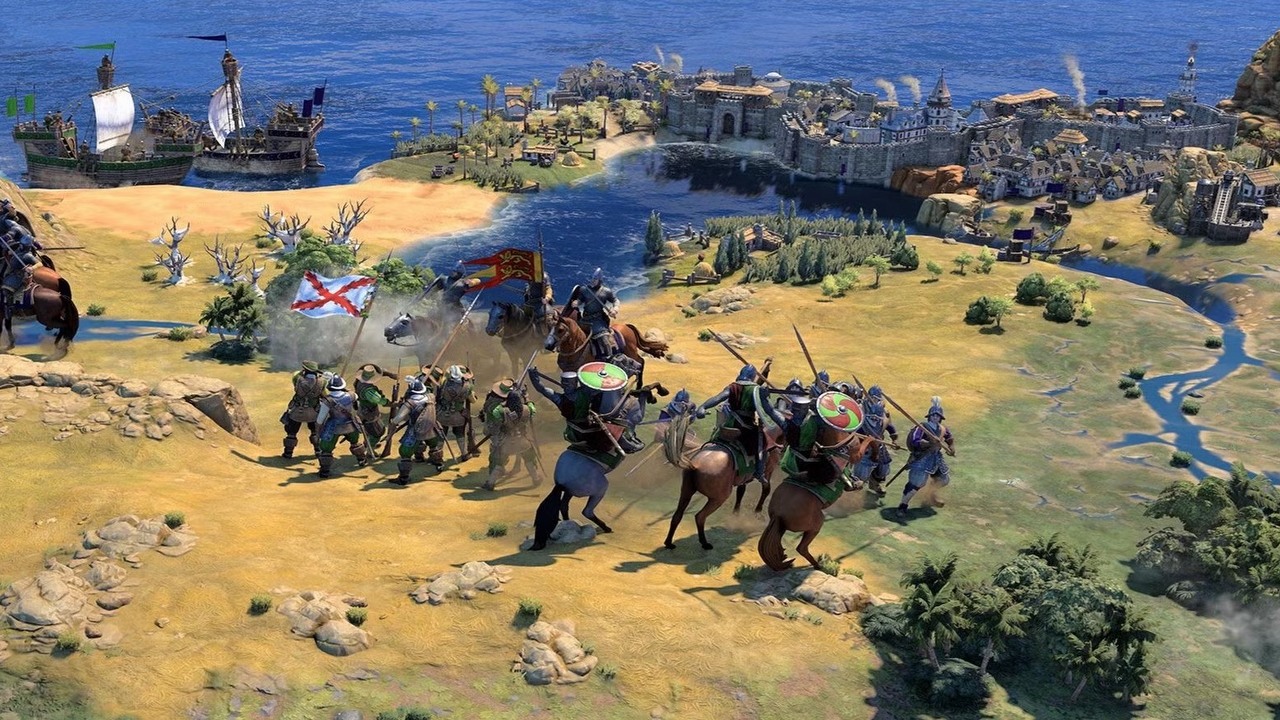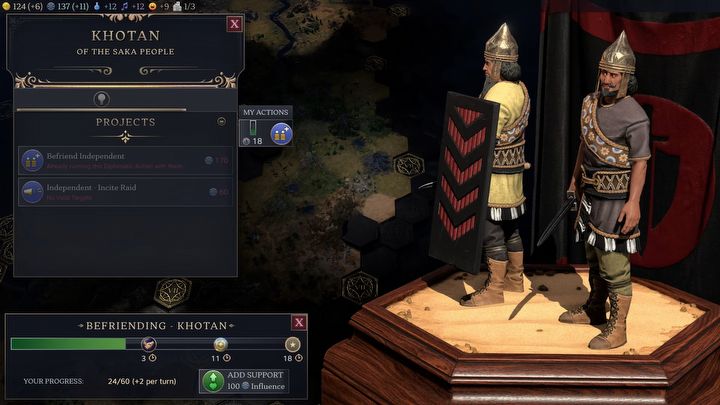Civilization 7 expands diplomacy and discourages burning of settlements
Diplomacy and trade are other elements that will change significantly in Civilization VII, including a new, expanded influence system.
1

There is a month left until the release of Sid Meier's Civilization 7 and the developers have already revealed almost all the secrets of the new installment of the cult series. In another developer diary, Firaxis studio discussed perhaps the last major elements of the seventh Civilization: trade, influence, and diplomacy. We outline them below, and further details are available in the post shared on the official game website (and on Steam).
Somewhat by chance, the devs have shared details about the upcoming modern civilization: the Chinese Qing dynasty, which will emphasize expansion and economy, gaining more advantages from importing resources (though at the expense of slower scientific advancement). The developers also released the musical theme of this modern nation.
You can find more information about the unique features of the Qing dynasty on the official game website.
Influential diplomacy
We received a handful of information about diplomacy (and espionage) earlier, but the sixth developer's diary contains a much more extensive discussion of this aspect. The creators primarily wanted diplomacy in Civilization VII to be more than just haggling over trivialities like individual goods. They aimed for it to be a tool for establishing actual, long-term relationships between civilizations or for preventing foreign aggression.
The foundation of diplomacy will be the influence that we know from the two previous installments of Civilization. It will work similarly to how it did in the sixth part of the series - but only seemingly.
In each turn, our nation will gain influence points, just like in the previous game. The point is, we won't solely use them to improve relations with specific cities via intermediaries who will show up after filling a special bar. Instead, the influence will function like a currency similar to gold and will be used to "finance" four available diplomatic actions. These are:
- Endeavors - mutually beneficial actions of two civilizations, for instance, jointly undertaking a research project;
- Sanctions - negative actions against another empire, for example, to weaken weapon production;
- Treaties - long-term joint decisions of the nature of opening borders or improving trade between both sides;
- Espionage - risky but potentially very beneficial actions that will strengthen empires or weaken their opponents. In case of failure, it will not only damage the relationship with the intelligence target but also temporarily decrease the influence points gained.
Civilizations will be able not only to accept or reject the proposals of these actions but also to show support for the initiator. Simply accepting doesn't require spending influence points, but in this situation, the majority of the benefits will go to the nation proposing it. On the other hand, providing support will require a "fee" upon receipt, yet it will be more advantageous for the party backing the proposed action.
The influence will enable interactions with Independent Powers (IP), improving relations and eventually allowing these entities to become city-states that recognize a particular nation as their suzerain. This will provide access to further options in relations with a given IP, for instance, expanding its army or even annexing it.
Influence points will be gained similarly to other resources: through buildings, civilization and leader abilities, politics, storyline events, etc. However, these won't only be positive bonuses.

Diplomacy will be used to gain the friendship of more than just other civilizations. Source: Firaxis Games.
Penalties for wars and aggressive expansion
We have already mentioned the penalty for gaining influence after the failure of a spy operation, but that's not all. The influx of diplomatic resources can also reduce aggressive actions on the world map, such as conquest or leveling a settlement to the ground.
Constructing a new city too near the capital of another civilization will lead to a reduction in influence points that the player will earn in subsequent turns. It seems that the developers aim to restrain the ambitions of leaders who focus on "dynamic development" at the expense of other nations.
Speaking of which: apart from the global influence, the key element will remain the relationships between specific civilizations. Some elements remained unchanged, including the level of relations (ranging from hostile and unfriendly to friendly and helpful) and their connection with available actions (military alliances will still only be available in the case of exemplary relations). The agendas, or leaders' preferences, are making a comeback, influencing which actions of other civilizations will earn the ruler's approval or disapproval.
Of course, sooner or later words alone won't be enough and the player may go to war with another nation. Even in armed conflict, diplomacy will play a crucial role due to a new mechanic: War Support and War Weariness. The system of dissatisfaction with the prolonged military actions isn't new, but in Civilization 7 it is something more than just a common "-2 to mood" thing.
Negative bonuses will depend on which side has less war support, with penalties also weakening the military potential of the "weary" army. Moreover, if a civilization decides to wage a surprise war (i.e. if the level of relations with the attacked party drops to openly hostile, it will also reduce the War Support level for the aggressor. Nevertheless, a sufficient level of influence can shift the balance and gain backing for military actions - even from other countries, as Civilization 7 allows spending influence points to improve war support for other nations in conflict.
Trade and economic routes of heritage
The desire to make "big" and long-term decisions also left its mark on the trading system, as well as the way of obtaining raw materials. We will achieve this not only through natural access to resources and trade but also by becoming the suzerain of city-states. Furthermore, resources can be distributed to specific cities, enabling them to gain specializations or receive special bonuses (such as for satisfaction), although each location will have a limited capacity for resources.
What's important, the resources of a particular settlement, city, etc., will be instantly accessible to any nation that dispatches a merchant there, thereby starting a trade route. In exchange, the owner of a given settlement will receive extra gold. Of course, this assumes that the automatically generated caravans will journey safely between the two trade hubs - enemy forces will have the opportunity to raid these routes.
Trade will also be linked to the economic Legacy of Paths, which are ambitious projects for each age that will bring the player closer to victory. In the case of economic domination, these will be: Silk Roads, Treasure Fleets, and Railroad Tycoon.
These are big changes and it's no wonder that, combined with the previously announced modifications, they have aroused considerable emotions. Some players aren't convinced by all the revealed new features (including the need to independently choose between land and sea routes), but many other improvements have aroused the enthusiasm of fans, including the return of the ideology system, which was missing in the sixth Civilization.
At least for now, because - as always - we will only find out how these changes will work in practice after the release.
Civilization VII will be released on February 11th on PC, PlayStation 5, and Xbox Series X/S.
1

Author: Jacob Blazewicz
Graduated with a master's degree in Polish Studies from the University of Warsaw with a thesis dedicated to this very subject. Started his adventure with gamepressure.com in 2015, writing in the Newsroom and later also in the film and technology sections (also contributed to the Encyclopedia). Interested in video games (and not only video games) for years. He began with platform games and, to this day, remains a big fan of them (including Metroidvania). Also shows interest in card games (including paper), fighting games, soulslikes, and basically everything about games as such. Marvels at pixelated characters from games dating back to the time of the Game Boy (if not older).
Latest News
- „They get more hate than they deserve.” Josef Fares comes to EA's defense and points the finger at Sony and Nintendo
- They used to ban them, now they make money on them. Rockstar opens Cfx Marketplace with paid and free mods
- „I don't get you guys”. New Tower mode in Diablo 4 divides players
- Euphoria didn't last long. „New” footprint of Prince of Persia: Sands of Time Remake turned out to be a painful return to the past
- „It's crazy that 50% of you are lying.” GTA 6 fans faced a tough choice: half would do it without hesitation


